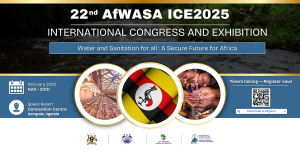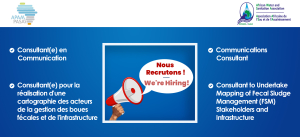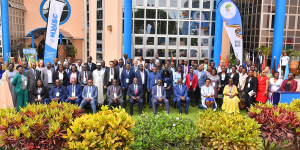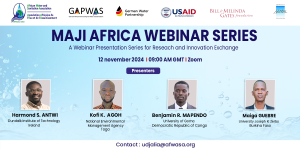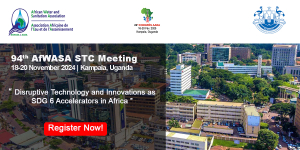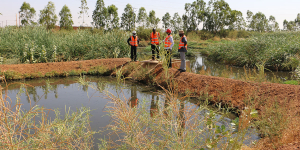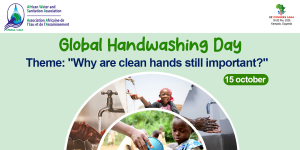Nzickonan Stéphanie
Join the Largest Water and Sanitation Event in Africa!
The Pan African Association of Sanitation Actors is Hiring
Application for the Position of Communications Consultant
Application for the Position of Consultant to Undertake Mapping of Fecal Sludge Management (FSM) Stakeholders and Infrastructure
Call for Candidacy for a position of Consultant to Undertake Mapping of Fecal Sludge Management (FSM) Stakeholders and Infrastructure
Terms of Reference
Consultancy to Undertake Mapping of Fecal Sludge Management (FSM) Stakeholders and Infrastructure
Duty Station: Abidjan, Côte d’Ivoire
Starting Date: December 15, 2025
Duration of Consultancy: 30 – 50 days spread over a period of 3 months
Nature of Consultancy: Mostly remote
1.0 Context
1.1 The Pan African Sanitation Actors (PASA)
The Pan African Association of Sanitation Actors (PASA) is an umbrella body of national associations of non-sewered sanitation actors in Africa. It is a not-for-profit, non-political network of peers whose mandate is to strengthen and develop the sanitation value chain on the African continent. PASA activities seek to unite all African actors in the sanitation sector to join forces to better defend the interests of the sector. PASA was officially launched in Cape Town, South Africa, on the sidelines of the Fifth International Fecal Sludge Management Conference in February 2019.
PASA embraces all private sanitation actors that share the Association's objectives and values. PASA’s current membership is drawn from 25 countries including Benin, Burkina Faso, Burundi, Cameroon, Gabon, Gambia, Ghana, Guinea, Guinea Bissau, Ivory Coast, Kenya, Malawi, Mali, Mauritania, Namibia, Niger, Republic of Congo, Senegal, South Africa, Tanzania, Tchad, Togo, Uganda, Zambia, and Zimbabwe.
1.2 PASA’s visions
“A leading association of sanitation actors operating professional, and safely managed sanitation services for all in Africa.”
1.3 PASA’s mission
“To strengthen the capacity of member associations in building professional, sustainable, accessible, and profitable sanitation enterprises.”
Though PASA is headquartered in Dakar, Senegal, it is presently in partnership with the African Water and Sanitation Association (AfWASA) which serves as a fiscal sponsor for its institutional strengthening program. Thus, PASA Secretariat is presently hosted by AfWASA in Abidjan, Côte d’Ivoire.
To supports PASA’s work towards improving the value chain of sanitation, AfWASA is recruiting a consultant.
2.0 Objective of Consultancy
The objective of this exercise is to map out manual emptiers in all 35 PASA member countries, and fecal sludge management treatment plants across the continent.
3.0 Scope of the consultancy
The scope of the consultancy will cover two broad areas.
-
Treatment plants and in some cases wastewater treatment plants that receive sludge from non-sewered systems and
-
Fecal sludge manual emptiers.
4.0 Deliverables
The consultant is expected to work closely with PASA members in its member states to produce the following.
-
First deliverable
Provide an inception report and detailed work plan with the methodology to be used in the mapping of FSTPs across the continent and manual emptiers in all 35 PASA member states.
-
Second deliverable
Provide an assessment of the mapping of FSTPs showing the type of FSTP and design, year of construction, who financed the construction, the capacity and number of people it is serving, the efficiency of the plant and lessons learnt from its operation and maintenance so far. This deliverable is also expected to provide the geospatial location of the treatment plant and other relevant information. The consultant will work with PASA to create an updateable database of these treatment plants to enable PASA and its partners use this as baseline and for tracking progress in the construction, use of FSTPs, treatment, reuse or safe disposal of fecal sludge. The consultant is expected to work with PASA Secretariat to present a report on the state of FSTPs in Africa in February 2025 at the launch of the 1 City – 1 FSTP initiative in Kampala, Uganda. This report will highlight the gaps, opportunities for investment and an approximation of the financial resources needed to ensure all FS is safely managed in Africa.
-
Third deliverable
Produce a database of fecal sludge manual emptiers showing their local associations (if any), biodata and nationality. It will also show if they have or are receiving any form support government or any organization including whether they have been vaccinated or not. From this information, the consultant is expected to develop a plan for improving the health, safety and dignity of manual emptiers in all PASA member countries.
-
Final deliverable
A detailed report of the mapping assessment conducted.
5.0 Minimum Qualification Requirements/Education and/or skills required
The consultant is expected to possess a minimum of the education and skills below.
-
PhD or Master’s degree sanitary engineering, environmental engineering, water management, or a related field
-
At least 20 years experience working on CWIS across Africa.
-
Experience woking with networks of sanitation actors is an added advantage
-
Extensive experience working to strengthen the value chain of sanitation in Africa
-
Ability to work with multiple stakeholders including government, community, civil society and private sector
-
Excellent written and spoken French and English with excellent technical report writing skills.
6.0 Travel required
The consultant is expected to travel to Abidjan, Côte d’Ivoire and Kampala Uganda within the period of the assignment.
7.0 Duration
The consultancy is expected to last 30 – 50 days across trois months.
8.0 Terms of Payment
The contract currency will be in US Dollars.
This consultancy will be based on a lumpsum payment in tranches based on deliverables provided in the terms of reference according to the table 1 below.
Table 1: Payment milestones.
|
S/N |
Deliverable |
Upon Submission and approval |
|
1 |
Signing of Contract and submission of inception report including work plan |
20% of consultancy lump sum |
|
2 |
Submission of second deliverable |
30% of consultancy lump sum |
|
3 |
Submission of third deliverable |
20% of consultancy lump sum |
|
4 |
Submission of fourth deliverable |
30% of consultancy lump sum |
9.0 Application Procedure
Interested candidates are expected to submit the following:
-
A curriculum vitae with evidence of previous related work
-
A short proposal on how the work will be done
AfWASA/PASA is working towards a gender equitable workforce, hence female candidates are strongly encouraged to apply.
Applications must be sent before 14th December 2024 to This email address is being protected from spambots. You need JavaScript enabled to view it..
Applicants must specify in the subject of the mail: Mapping of Fecal Sludge Management (FSM) Stakeholders and Infrastructure
Only shortlisted candidates will be contacted.
Closing of the 94th AfWASA STC Meeting: the countdown to the 22nd Congress has begun
After three productive days of exchange and strategic reflection, the 94th AfWASA STC Meeting officially came to a close on Wednesday November 20 in Kampala.
The day began with the presentation of the GREEN PILOT PROJECT FOR SUSTAINABILITY, an ambitious project designed to promote sustainable practices in the water and sanitation sector. This initiative, which focuses on ecological innovation, aroused keen interest among participants, underlining the importance of green solutions in the management of water resources in Africa.
Participants then heard detailed presentations on the forums planned for the next Congress, including the Youth Forum and the Women's Forum, platforms dedicated to mobilization and inclusion. A draft agenda for the 22nd Congress, to be held in February 2025 in Kampala, was also shared, providing an outline of this key event.
Another highlight of the day was the presentation of the work of the specialist groups, who had been working on strategic themes linked to the disruptive technologies and innovations needed to achieve SDG6. These presentations enabled concrete ideas and practical recommendations to be shared, laying the foundations for future action on a continental scale.
To conclude the meeting, participants took part in two technical visits, one to the sewage sludge treatment plant and the other to the water quality laboratory of the National Water and Sewerage Corporation (NWSC). These innovative facilities are testimony to Uganda's best practices and technological advances in the water and wastewater sector.
The meeting concluded with a formal invitation to the 22nd AfWASA International Congress, to be held in Kampala from February 16 to 20, 2025.
94th AfWASA CST Conference: presentations and work by Specialist Groups on the second day
Tuesday, November 19 was the second day of the 94th meeting of the African Water and Sanitation Association (AfWASA) Council, in Kampala, with a program featuring presentations and work by specialist groups.
Debriefing of the first day
The day began with a debriefing of the first day, enabling participants to look back on the highlights and major discussions of the previous day.
Presentation of AfWASA's gender mainstreaming strategy
A key presentation highlighted the results of AfWASA's gender survey. This initiative shows the association's commitment to promoting an inclusive and equitable approach to the water and sanitation sector. Participants discussed strategies for strengthening the role of women in the sector's decision-making and operational processes.
Collaboration and data sharing in Africa
Another presentation focused on the importance of collaboration and data sharing across the continent. Access to reliable, up-to-date data was identified as a crucial lever for improving performance and decision-making in the water and sanitation sectors.
AfWASA activity reports: August to November 2024
AfWASA's Executive Director presented a detailed review of activities carried out between August and November 2024. The report highlighted progress made, challenges encountered and initiatives to come, reaffirming the association's momentum and catalytic role in the region.
Preparations for the 22nd Congress in Kampala
Another highlight of the day was devoted to the state of preparations for the 22nd AfWASA Congress, scheduled for February 2025 in Kampala. The presentation detailed organizational progress and next steps, while inviting members to get actively involved to ensure the success of this major event.
Specialist group work
The day concluded with the start of work by the specialist groups, who were given a precise roadmap to guide their reflections and discussions. Their task was to :
Take stock of existing breakthrough technologies and innovations in the water and sanitation sector in their country or utility.
Identify the essential systems, processes and services that need to be disrupted to accelerate the achievement of SDG6.
Define the role of different players in facilitating disruptive technologies and innovations in the sector
Identify critical capacity-building needs that AfWASA should address.
The work of the specialist groups continues until late Wednesday morning. Restitution is scheduled for early afternoon.
94th AfWASA meeting: Disruptive technologies at the heart of discussions
Under the theme: disruptive Technology and Innovation as SDG6 Accelerator in Africa, the 94th AfWASA Strategic and Technological Council Meeting officially opened on November 18 in Kampala, Uganda.
Members of the Association came from all over Africa, Asia and Europe to take part in this preparatory meeting for the 22nd AfWASA Congress, scheduled for February 16-20, 2025, in Kampala.
An Opening Ceremony focused on Innovation
The first day of the meeting was marked by an opening ceremony featuring a number of speeches emphasizing the urgency of adopting innovative and disruptive technologies to accelerate access to drinking water and sanitation services for African populations.
Technical sessions to share experiences
The day's proceedings were organized around three main sessions:
Session 1: Disruptive Technologies and Innovations in the Water and Sanitation Sector
A key note presented a case study on the integration of disruptive technologies in water and sanitation supply in Uganda. It showed how these innovations are transforming the sector and opening up new opportunities.
Session 2: Research as a Catalyst for Technologies and Innovations to Achieve SDG 6
This session explored the central role of research in technological progress and innovation. An introductory note underlined the importance of research as a key driver for solving the continent's complex water and sanitation challenges.
Session 3: Governance and Financing of Technologies and Innovations
This session addressed strategies for effective governance and sustainable financing of technological innovations in the sector.
The 94th AfWASA conference runs until November 20.
We'll be back with more details on the first day of the AfWASA conference.
Join AfWASA Webinar Series on Solutions and Innovations in the WASH Sector
Maji Africa Webinar Series is adopting an online format for technical exchange and discussions about research findings on different thematic areas related to WASH solutions and innovations in Africa. The platform is dedicated to researchers, innovators, students, professors, consultants, and any other webinar presenters.
This also comes as an opportunity for AfWASA research fellows to present their findings in front of a big international audience, as well as for those who submitted their abstracts for AfWASA Congress, but unfortunately were unable to attend and present them.
Topics to be developed
1) Phytoremediation of soils contaminated with heavy metals (mercury, zinc, cyanide, arsenic, iron) by gold mining activities in Burkina Faso for the protection of groundwater and surface water.
2) Management and supply of water domestic use in conflict zones: the case of the KANYARUCHINYA displaced person camp (Eastern Democratic Republic of Congo)
3) The management of water services and its health and environmental impacts in the Golfe 1 municipality in Togo
4) Sustainable Water Governance in a Changing Climate: An Actor-Network Approach to Stakeholder Engagement
Methodology
The Maji Africa Webinar series, hosted monthly in AfWASA’s Zoom webinar platform, engages researchers, innovators, students, professors, consultants, and any other Webinar presenters, in sharing their research findings as well as new ideas and research areas to solve the water problems in Africa.
The webinar series is open to the public and the recordings as well as presentations can later be accessed by members via the AfWASA Knowledge Management Platform.
Registration link:
https://us06web.zoom.us/meeting/register/tZIvcuqpqDksHddSaexiEXFWZHVTmSMXoppV
ID de réunion : 862 5316 2673
Code secret : 202294
Registration for the 94th AfWASA Scientific and Technological Meeting is now open
We are delighted to announce that registration for our 94th STC meeting is now open.
Please register by clicking on the following link https://meetings.afwasa.org
Note that your member code will be required for your registration. If you no longer remember your code, please write to This email address is being protected from spambots. You need JavaScript enabled to view it. .
For information on travelling to Uganda, please click on the link: https://www.visas.immigration.go.ug/#/apply
We look forward to seeing you in Kampala for a fruitful discussion on the future of water and sanitation in Africa.
Capacity building: AfWASA members learn from Office National du Sénégal
Capacity building: AfWASA members learn from Office National du Sénégal
The African Water and Sanitation Association (AfWASA) is organizing a benchmarking visit to Office National de l'Assainissement Senegal's (ONAS) from October 29 to 31, 2024, as part of its mission to build the capacity of water and sanitation operators to provide better services to the population. The visit will benefit AfWASA members from Niger, Ghana, the Republic of Guinea and Togo.
The aim of this initiative is to promote knowledge sharing between ONAS and the participants, to highlight best practices that position ONAS as an African leader in sanitation management, and to gather useful information for improving sanitation services in the participants' respective countries. The delegation is made up of some twenty sanitation professionals representing ministries, municipalities, emptiers and local experts.
The agenda includes indoor working sessions and a field visit.
During the indoor sessions, presentations will be made on the state of sanitation in Senegal, ONAS's missions, progress made, challenges encountered, as well as strategies for resolving them and prospects for improvement. Participants will also have the opportunity to present the sanitation situation in their own cities, followed by discussions aimed at better understanding local contexts and developing appropriate action plans.
As for the field visit, it will enable participants to discover sanitation infrastructures at first hand, explore the technologies used and observe the application of the concepts discussed in the classroom.
This benchmarking visit is part of AfWASA’s Citywide Inclusive Sanitation Program funded by the Bill & Melinda Gates Foundation and USAID.
Global Handwashing Day: AfWASA works in collaboration with stakeholders in the sector to ensure sustainable solutions
On October 15, we celebrate Global Handwashing Day, an opportunity to highlight the crucial importance of this simple yet vital gesture for our health. This year's theme, “Why is handwashing important?”, invites us to reflect on the immense impact this habit can have on preventing disease and protecting our communities.
Unwashed hands are one of the main causes of diarrhoeal disease worldwide, and among the leading causes of infant mortality in Africa. Studies show that in sub-Saharan Africa, only 15% to 25% of people regularly wash their hands with soap after using the toilet or before eating, despite the fact that this can reduce diarrheal infections by 40% and respiratory infections by 21%. Faced with this alarming situation, the African Water and Sanitation Association (AfWASA) is actively committed to promoting good hygiene practices through large-scale awareness campaigns and initiatives to improve access to clean water and sanitation facilities across the continent.
Hand washing with clean water and soap is the first line of defense against the transmission of infections. Our hands are in daily contact with many surfaces, objects and people, accumulating millions of germs. These microbes, invisible to the naked eye, can cause serious illnesses such as diarrhea, influenza, cholera and, more recently, COVID-19. According to the World Health Organization (WHO), 80% of infections are spread by the hands. This figure shows just how effective this simple gesture can be as a shield against contamination.
Hand washing is particularly important in vulnerable environments such as hospitals, schools and kitchens. For children, regular hand-washing significantly reduces the risk of diarrhea and respiratory infections, the main causes of infant death in some parts of the world. For adults, this gesture not only protects our own health, but also that of the more fragile people around us: the elderly, the sick or even pregnant women.
Beyond individual protection, handwashing is an act of solidarity. By breaking the germ transmission chain, we help keep our communities healthy, relieve pressure on healthcare systems and reduce absenteeism in schools and workplaces. It's a universal gesture that transcends borders, ages and cultures. AfWASA, aware of the stakes, works tirelessly with water and sanitation stakeholders to ensure that everyone, especially in rural and peri-urban areas, has access to adequate handwashing facilities and soap.
However, it's important to remember that handwashing is more than just a quick rinse under water. It must be done properly, rubbing all parts of the hands for at least 20 seconds, with soap. This attention to detail makes all the difference in eliminating germs.
On this Global Handwashing Day, AfWASA would like us to make this a daily reflex, not only for ourselves, but also to protect those we love. Together, by adopting this simple habit, we can build a healthier, safer future for all.
Wash your hands, save lives!
Olivier Gosso
AfWASA Executive Director

 English
English  Français
Français 
